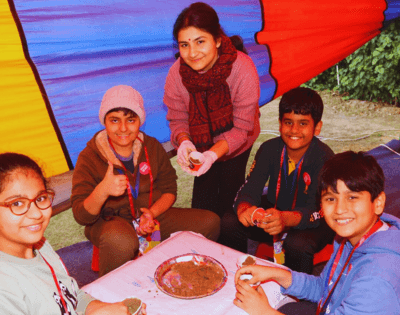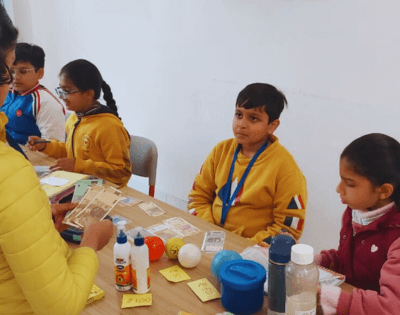The traditional classroom setting has long been the cornerstone of learning. However, as we navigate the ever-evolving landscape of pedagogy, it becomes increasingly evident that there is a world beyond the four walls of schools—a world waiting to be explored.
At The Blue Bells School, we make sure our children explore that world and learn from their experiences. It’s the transformative force that helps children develop better and holistically.
For us it’s a pedagogical tool that transcends the confines of textbooks and lectures, propelling education into the real-world of experiences. In this blog, we’ll cover the points on How teaching through Field Trips actually help children in learning from real-world experiences.
Power of Experiential Learning:
Numerous studies & research from experts consistently affirms that experiential learning, such as that encountered on field trips, enhances academic performance and deepens understanding.
When students step outside the classroom, theoretical concepts come to life, fostering a connection between knowledge and its practical applications.

Trip to Sariska Tiger Reserve where students explored the wildlife, biodiversity and formed a connection with Nature.
According to a study by the American Educational Research Association, students engaged in experiential learning show greater retention of information and an increased ability to apply concepts in diverse contexts.
Cognitive Development and Critical Thinking:
Teaching through Field trips act as catalysts for cognitive development, stimulating curiosity and critical thinking skills. When students are immersed in real-world scenarios, they are prompted to analyse, question, and solve problems on the spot. Museums, historical sites, and science centres become dynamic classrooms where information is not just absorbed but actively processed.
The Blue Bells School is known for making experiential learning a core foundation of its curriculum, and with regular fiend trips, our students just don’t learn, but observe, grow & retain.

Sariska Tiger Reserve
Cultural and Social Awareness:
Education extends beyond textbooks—it encompasses an understanding of the world and its diverse cultures. Field trips provide students with the opportunity to step into different environments, fostering cultural competence and social awareness. Visits to museums, cultural landmarks, or community service projects expose students to perspectives beyond their own, nurturing empathy and a broader worldview. As our world becomes more interconnected, these experiences are invaluable in preparing students for global citizenship.
Building Lifelong Memories:
Beyond the academic benefits, field trips create lasting memories that students carry into adulthood. The emotional connection formed during these outings can leave an indelible mark on a person’s educational journey.
Our educators observed that students who participated in field trips during their school years demonstrated a deeper appreciation for cultural heritage and a continued interest in lifelong learning.

Trip to Rashtrapati Bhavan where students gained a profound understanding of India’s rich history, cultural heritage, & the functioning of its highest office, enriching their civic knowledge.
Practical Considerations:
While the benefits of field trips are abundant, practical considerations often pose challenges for educators. Limited budgets, logistical issues, and time constraints can deter schools from incorporating these experiences into their curriculum.
However, The Blue Bells School for Integrated Learning makes sure that these challenges do not come in the way of our learning and ensures that all students have access to the enriching world beyond the classroom.

Rashtrapati Bhavan
Conclusion:
Field trips stand as beacons of transformation, bridging the gap between theory and practice. The research is clear: real-world experiences not only enhance academic performance but also shape individuals into well-rounded, culturally aware, and critically thinking citizens.
As we at The Blue Bells School continue to seek ways to cultivate the minds of the future, we never forget the invaluable lessons that lie beyond the classroom walls—lessons waiting to be discovered through the transformative power of teaching through field trips.




